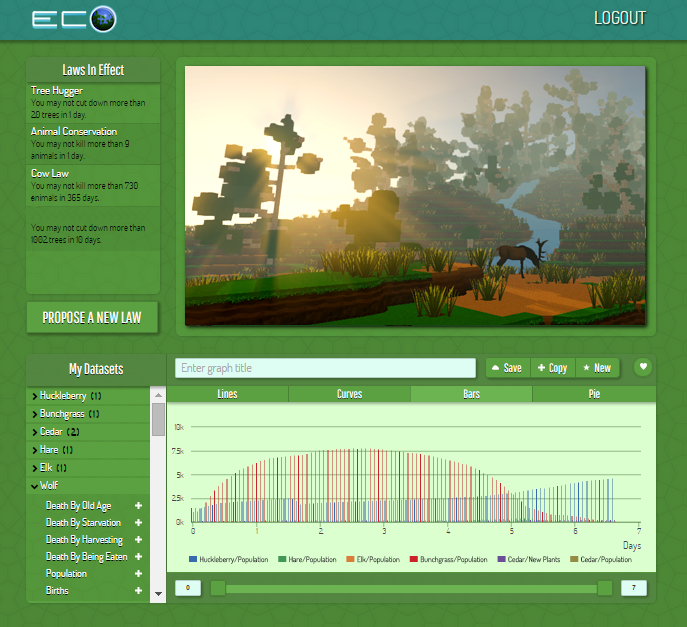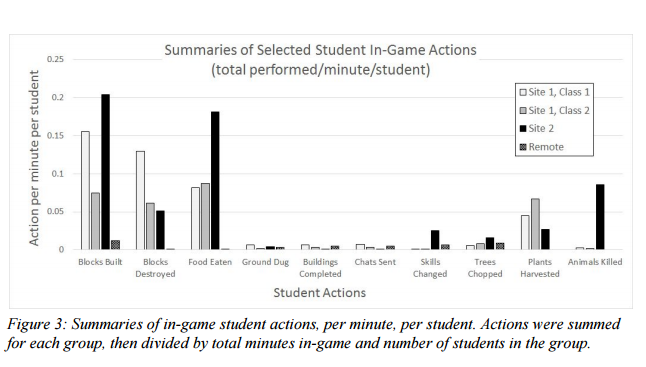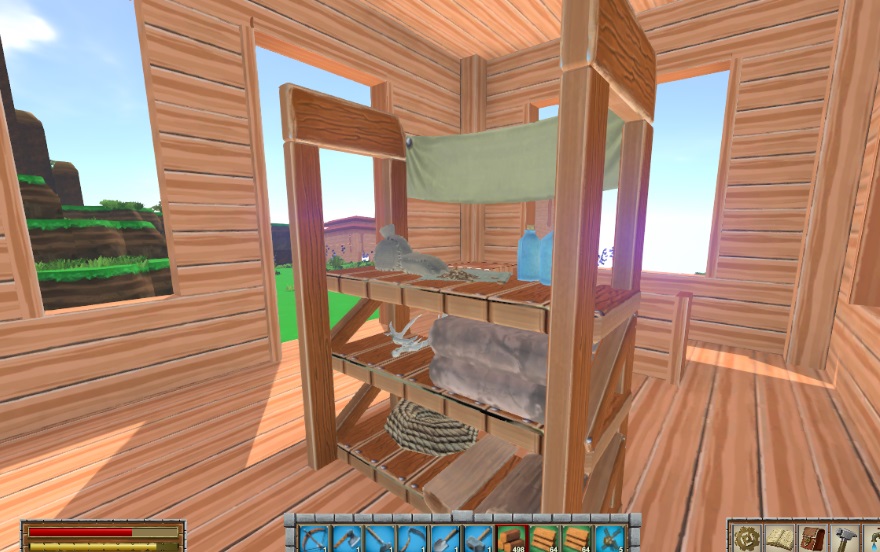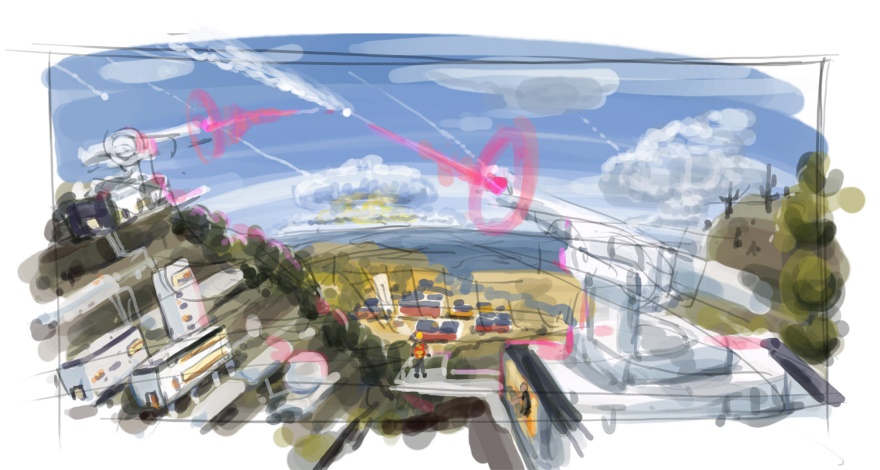
Like the idea of survival games, but not PvP? Wish your class involved video games? Maybe you want to doom humanity to choking itself on its own filth?
Well, good news for all of you: Eco made its initial Kickstarter goal!
The game is basically a PvE survival game launching with player made governments where players use server-provided data on the environment (such as number of deer, population over the past month, and cause of death) to make laws. These laws aren’t just ideals but server enforced rules created and voted on by players, so if people choose to allow players to kill only three deer a day, the game prevents you from killing a fourth. Over harvesting leads to extinction, not just of that species but others related to it, which can eventually lead to the death of a world (read: server-wide permadeath via PvE). The emphasis on social tools, data use, and environmental balance isn’t a coincidence, however; Eco is built to be used as an educational game.
“People recognize the power of games,” said Strange Loop Games founder and Eco designer John Krajewski when I approached him about doing an interview on how and why Eco was made as game pushing education. “Couple that with the fact that just now we have teachers in the workforce that grew up with games and are open to them and see their potential for learning, the market is ready to take off there.”
Krajewski said he’d had the idea for the game “rolling around” his head for years, and “it always had that educational aspect, but the idea of making it explicit and looking to sell to educators came on later, as that idea became more of a possibility and grants paved the way.”
However, Eco isn’t supposed to just be educational but also give “something to players beyond entertainment,” like an educational experience that can can be seen as “a benefit and not a detriment. Players are so trained to be suspect of something educational, and rightly so because educational games are typically sub-bar to regular games. [Strange Loop Games’] mission as a studio is to demolish that distinction” by giving players incredible experiences that hopefully also make them more educated people.
While Eco may be an environmentally friendly, that wasn’t entirely the inspiration of the game. Instead, Krajewski says, “the game is centered on the idea of ‘The tragedy of the commons’, the individual vs the group, collaborating in a shared world in which all our fates lie.” I rarely have my PvP side and teacher mode internally squealing together but, well, it happened, even though there isn’t direct player killing in Eco. It happened again when Krawjewski said that “collaboration is one of the most useful skills to have in this modern era; it connects to every other subject, and there’s infinite types of experiences you could build on top of an engine that supports it.” It gives me hope that other subjects, such as math, business, perhaps English as a Foreign Language, could also build a class around the game or a mod of it.
Mass appeal
When I initially found out about Eco, I was both excited and slightly embarrassed. While working on my MA in Linguistics, I had a teacher who let us choose a few class topics, and one of them involved “computer assisted language learning,” or “CALL,” and yes, that includes video games. We saw an “English class” in Second Life, and while it was amusing, it seemed problematic (and I think my professor and I both knew that people did, ah, other things(NSFW) with SL as well). While SL classes seemed fun, some of the students in the video admitted that it didn’t feel like learning and didn’t seem serious, and my classmates admitted that including the use of video games in the classroom would be difficult even if it felt relevant.
When I approached Krajewski about a possible interview and voiced this concern about how “gaming and teaching don’t mesh,” he actually asked me a question: How do you change that?
My immediate response was that it needs to be a generational thing. Even right now, games in the classroom at a research level are generally very limited. Oddly enough, SL is the game most used and researched. World of Warcraft has gotten some use too, but in my estimation, the schools using WoW are probably very well fed, in trendy cities, or private schools.
In order for the masses to understand how games can be used for education needs, a game first has to be easy to integrate into the classroom, non-violent, explicitly include academic tools, affordable for your average school and able to run on their largely dated machines, and easy to use by the technologically inept. And that would just be so that teachers accepting of game culture have a chance to seriously introduce the game to their fellow teachers/administrators and move past the usual “why video games” discussion. Without that, pitching how the game educates is nearly impossible.
Krajewski acknowledged this and mentioned that he felt the best way to tackle part of this issue is to meet students halfway. Minecraft is a game many teachers have heard of, and they know students are passionate about it, so wouldn’t a similar game that uses similar ideas in an educational context have similar power to engage students? It was an interesting idea, so with that in mind, Krajewski gave me access to the document that won his company a government grant to help it build the game. While the YouTube pitch was good, I wanted to see something a bit more academic about the methodology and mechanics of the game, and I was not disappointed.
In order to get over the problem with teacher usability, the game has tools and features specifically designed with teachers and administrators in mind. Krajewski already mentioned that whitelisting is in the works, making it easier for schools to ensure the game can get past their filters, and Strange Loop’s motto in terms of teacher usability is “Make it as easy as an iphone.” If a teacher can use a smart phone, they should be able to use the game’s app and server tools. I know plenty of young teachers who are obsessed with social apps, so hopefully they can put those skills to good use!
Of course, this is only the tip of the iceberg. I spoke to Dr. Rachel Kowert last year about games and psychology, and while the situation has improved, public perception still hasn’t fully embraced the gamer. However, one advantage Eco has that should help keep this to a minimum is that the game’s violence will be “very light, no worse than Minecraft,” and that in the classroom, teachers have full control over the world; they’ll be able to delete buildings shaped like penises “rocket ships” and even know who built them (Randy’s mom will not be happy to answer that call from school!). Keep in mind that admins of the commercial game will have different options than teachers and that while the retail version of the game will have “optional content” people can buy, student accounts will have DLC purchases disabled and controlled by the schools (though the current plan is to allow students to keep their Eco accounts after they graduate from their class, even if they have a separate retail account).
Despite testing the game in the classroom, Krajewski told me,
The goal is to have students play at home or after school; it’s the ‘homework’, so then the classroom time can be used more efficiently: viewing, analyzing, and discussing whats happening in the world as a group and making decisions, led by the teacher. I think the traditional way of students using tech by sitting alone in front of a computer during class time should change; its a waste of the shared, social space of the classroom.
In some ways, this is something that I think many western teachers can accept and support. Students can “play” the political part of the game through an app, so they can be researching and making decisions about the game without being in it and worried about starving to death in-game.
Finally, for those worried that the survival genre mostly appeals to “boys” or that games in general are uninteresting to girls, Krawjewski says,
I hope this game can help rectify that imbalance. Collaboration, connecting people, and communicating may be an avenue that is especially appealing to girls, and those are incredibly key skills in Eco. I’d like to avoid imposing traditional gender roles like clothes and decorating, though we will have some of that necessarily.
In terms of appealing to the non-gamer masses, I think Eco hits all the points needed to get most educators, administrators, and parents to take the game’s pitch seriously. However, just being an accessible game isn’t enough, especially for people holding onto the school’s wallet. There needs to be a reason a game can do a better job than just a more creative text book.
Research problems and goals
Before judging whether the game is up to the task, we need to look at the specific perceived academic problems that led to Eco‘s creation as an academic tool. The perceived core issue is that environmental concerns are growing, but schools are not preparing American students, who rank 17th globally in science among first world countries, to tackle the issues. Students need 21st century skills to do this, which means they need to be able to:
- Use technology effectively.
- Meet “rigorous content and skill standards” (read: not make up “facts”).
- Foster interdisciplinary skills (not just in game skills like mining and blacksmithing, but data analysis and debate skills).
- Promote collaborative problem solving (migrating animals really don’t care whose country they enter, so we have to work across borders).
This is where Eco comes into play. The broad goals the game are to help students learn:
- Scientific content knowledge related to human impact on the environment.
- Engage in critical thinking and scientific argumentation.
- Improve students’ views on the relevancy of science in modern society.
- Learn collaborative problem solving skills.
Topically, the game wants to teach students that:
- Natural resources are limited.
- Changes to the physical world affect the ecosystem and its population.
- Species are connected to each other and effects on one trophic level affects the others.
- Competition between species at similar trophic levels affects populations.
The way the game wants to teach these is through “civilization goals” provided in game, such as:
- Build houses for everyone, which threatens the wood supply.
- Build a dam for power, which threatens the salmon population.
- Develop pesticides to increase crop yields, threatening bird populations.
- Develop boats for access to fish, which causes fluctuations of aquatic populations.
This last part’s important because, much as in real life, progress comes with a price. While Ultima Online initially also had limited spawns and an ecosystem, the game had no punishment for ruining it. There was no “reset” button or danger to players, just boredom. The balance in Eco could be frustrating (worlds ending in extinction) or tedious (material grinding severely limiting in game actions), but Strange Loop’s already found some ways to help guide player actions and experiences.

How Eco (currently) tackles its research goals
The idea behind the game is that students see the effects of their gameplay, both through in-game graphs and the visual environments (i.e., players can’t interact with all the fish they see, but the populations they visually see are used as an overall indicator of the environment’s health). Students either succeed by building a visually impressive world or fail by destroying it, both of which are (hopefully) a memorable experience.
Let’s put that another way: The game is set with limited resources, much as in real life. Everyone and everything are linked, again, as in real life, but in Eco, there are world-ending catastrophes you’re warned of and given time to avert by developing the right technological device.
Instead of endlessly grinding, players need to choose when to grind and when to preserve in order to not only for their own benefit but for their basic survival that’s being threatened; sitting around is not an option. If you don’t preserve, your in-game skills can become useless (assuming over harvesting doesn’t cause any kind of world-threatening extinction; remember, you still need to eat, drink, and have shelter, as in any other survival game). Preserving means you now have down time to look at how to maintain the best grind and convince others that you know that’s right. You don’t have to make laws; you can just vote on them at your leisure using the game’s out-of-game mobile/web app.
Now, the critical thinking, scientific argumentation, and collaborative skills we want students to develop are supposed to be supported by using the game generated graphs that track various details of the game world, which students should use (in-game or via the mobile/web app) for creating in-game laws. Students can also leave comments on other potential laws before voting them into effect. The UI that contains the graphs, proposed laws, and commenting system was developed to be used on multiple platforms, such as tablets and smartphones, so it’s easier to participate in the game’s politics and research.
The hope is that as students see their society progress, they’ll make real world connections to their own society. The game developers are also including real world materials to help better connect the classroom with the game, such as student-centered discussion topics, “science content knowledge” (meaning lessons on relevant science topics), and real world comparisons.
To note, Strange Loop was not alone in their creation of Eco. The University of Illinois at Urbana-Champaign helped during the prototype, helped with the initial idea and project direction, helped develop the ecosystem with a basis in science (i.e., the game has mining, so the game included “runoff from tailings” — that is, waste rock), tested Eco in classrooms, and prepared the results in the report that led to the government grant. However, the two have since parted ways. (The split had nothing to do with the Steven Salaita controversy; when I asked Krajewski what happened, he said, “UIUC decided to pursue other ventures, and we’re going to be looking for other research partners or hires over the two years we’re funded for by the Dept of Ed.”)
Now, the study by UIUC observed three classes on site (but also used feedback from offsite schools), two at the same location on the same day, and another at a different location at a later date. The groups at the other sites had students who volunteered themselves, so they possibly had more gamers. Seeing as the game got its grant, you can guess that the study was deemed successful, but I want to go into some details that I found interesting, especially after viewing the graph below. To be clear though, students at site 2 used a different build of the game to supposedly help keep students focused on their proposed goals.

First, buildings were granted protection to try to help foster more collaborative environment. The students at site 1 focused more on destroying stuff than site 2 students. Site 2 did focus on the PvE stuff much better but also used chat the least, while the big “block destroyers” used chat the most. What’s even more interesting, though, was the small amount of in-game chat. This seemed worrisome, but when I talked to Krajewski about this, the reason was easily explained: Students were in the same location and were able to talk face to face, which is something the in-game tools obviously couldn’t record; the same was true of other online discussion groups, such as private forums for the game used by the remote site groups. Still, it makes me wonder, were the block destroyers talking more because they were talking smack, or was there maybe discussion/negotiation in terms of planning the attacks or trying to end them?
Site 2 also got more scaffolding in the form of achievements. They are the same group that built the most but chatted the least. While students were talking face to face, I wonder why the destroyers talked more. Either way, one thing to note was that the difference between Site 2’s advantage in killing animals over their peers but lack of plant harvesting is directly tied to achievements. The other groups had none, while group 2 had an achievement for collecting meat, showing that achievements really do guide player actions (for better or for worse).
When giving feedback at the end of the study, teachers said they valued their time with Eco but worried most about including it in their lessons and having it align with accepted standards and curriculum, which is one of the problems I had voiced to Krajewski before reading this report. There is, naturally, some pressure/temptation to have the kids play the game a little at school because, well, we are using it in school. Think of your normal classes. You read the book a little in class so the teacher can focus on difficult ideas for projects or discussions, but you’re supposed to do most of the reading at home. Now replace “reading” with “playing video games.” The game sort of feels like it needs to enter the class at some point.
Eco may not have all the right answers for educators, but it has answers, and most of them are at least satisfactory as far as I’m concerned. Krajewski and his team have some good concepts supported by good research and methodology, funding from the US government, and now funding from the public. Being both an educational and commercial project may seem awkward to some, but it makes the game feel more relevant, sort of like how novels or movies can teach people some ideas they wouldn’t normally draw from a text book. I want to thank John Krajewski again for discussing the game with me and giving me access to documents to get a better understanding of what Strange Loop is building. Hopefully this helps some of you readers understand the game and its goals better as well (especially if you’re fellow educators or students!).

















